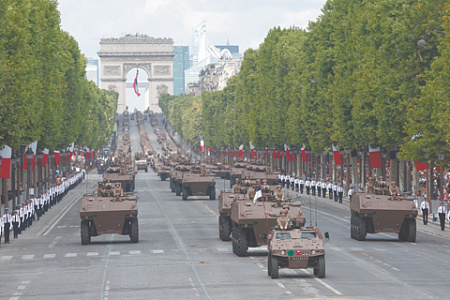
In a bold declaration on the eve of Bastille Day, French President Emmanuel Macron announced an ambitious plan to dramatically increase military spending, citing an increasingly unstable geopolitical landscape. The move is driven by a desire to counter a host of global threats, from terrorism and nuclear proliferation to cyber-attacks and the ongoing war in Ukraine. In a stark justification for the spending surge, Macron told the nation’s military leaders, “To be free in this world, we must be feared. To be feared, we must be strong.”
The primary objective is to elevate France’s defense budget to an astounding €64 billion by 2027, effectively doubling the expenditure from a decade prior. This represents a significant acceleration of a previously stated goal, which had targeted the year 2030. The plan is central to Macron’s vision of France as the preeminent military power in the European Union, with the president even initiating a “strategic dialogue” with European partners about the role France’s nuclear arsenal could play in the continent’s collective defense.
However, these grandiose plans are on a collision course with France’s harsh economic realities. The nation is grappling with a severe budget deficit, which stood at €94 billion as of May 2025, and a public debt that reached 113% of its GDP in 2024. This raises a critical question: how can a government already struggling to find €40 billion in savings realistically fund such a massive military expansion without imposing deep and painful cuts elsewhere?
The proposal faces a treacherous path through France’s deeply divided political landscape. While the far-right National Rally, led by Marine Le Pen, might ideologically support a stronger military, it is fiercely opposed to Macron’s pro-European ambitions and using French funds for the defense of the wider EU. Conversely, parties on the left are expected to vehemently resist the plan, fearing that the military budget will be bolstered at the expense of vital social programs, setting the stage for a bitter parliamentary battle.
This impending conflict turns the upcoming 2026 budget presentation into a high-stakes test for Prime Minister François Bayrou’s government. Having barely survived a no-confidence vote over a deeply unpopular pension reform, the government remains in a precarious position. The National Rally has already signaled its intent to challenge the government’s leadership over the budget this fall. An alliance of convenience between the far-right and the left could prove fatal, potentially leading to the government’s collapse.
Political analysts view Macron’s announcement as both a traditional assertion of French ambition and an unconventional, high-risk political maneuver ahead of the 2027 presidential elections. Some have compared it to a gambit to capture the support of an electorate tired of indecisive leadership. By raising the stakes so dramatically amid severe economic strain and political fragility, Macron has plunged the future of French politics into a state of profound uncertainty.
